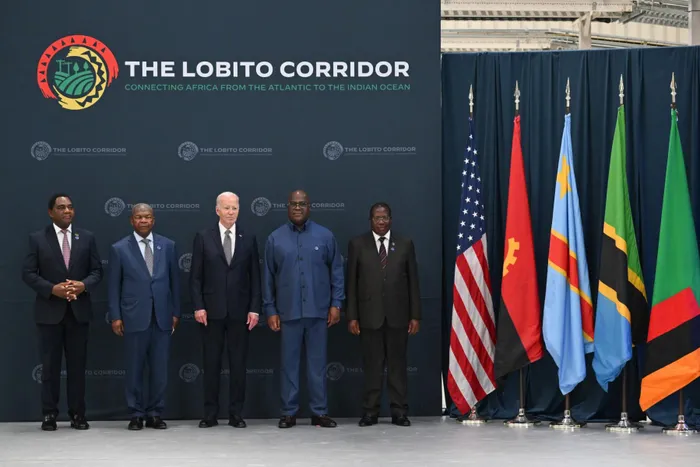Navigating Tensions: AFRICOM's Role in SADC's Security Landscape

ZAMBIAN President Hakainde Hichilema, Angola President João Lourenço , US President Joe Biden, Democratic Republic of Congo (DRC) President Felix Tshisekedi, and Tanzania Vice-President Philip Isdor Mpango at the Lobito Corridor Trans-Africa Summit held in Benguela, Angola on December 4, 2024.
Image: AFP
Dr. Sizo Nkala
The US Africa Command (AFRICOM) – the combatant command responsible for carrying out the US Department of Defence’s military operations, exercises, and security cooperation in Africa – could sow divisions within the southern African region.
The leadership of the AFRICOM, including the Deputy Commander Lieutenant General John Brennan and Ambassador Robert Scott, made what seemed to be successful visits to Angola and Namibia at the end of July.
In both countries, the parties discussed mutual security interests, including promoting stability in southern Africa, tackling wildlife and timber trafficking, drug cartels and terrorism, which are a threat to regional peace and stability. The visits followed the Obangame Joint Military Exercise conducted in Cape Verde in May, in which both Namibia and Angola took part alongside 22 other African countries and the US.
In Angola, it coincided with the Joint Combined Exchange Training (JCET) where Angolan and US troops were conducting live fire exercises aimed at improving combat readiness and the interoperability of allied forces.
With the US-funded Lobito Corridor, a railway track which will connect Angola’s Lobito port to more inland countries like Zambia and the DRC, Angola is central to US economic interests in southern Africa. The AFRICOM leaders emphasised that they seek to work with African countries in a manner that enhances their sovereignty and autonomy rather than their dependency.
This dovetails with AFRICOM’s doctrine of ‘African Solutions to African Problems’. With its deeper knowledge and experience in maritime security, counterinsurgency activities, and peacekeeping operations, AFRICOM could be a valuable partner for states in the region dealing with violent conflicts in the Democratic Republic of Congo (DRC) and Mozambique’s Cabo Delgado province. In flaunting its credentials and values, the AFRICOM leaders could not miss an opportunity to throw shade at US geopolitical rivals – China and Russia – whom it accused of treating African militaries as their training aides.
However, the mood was decidedly different for AFRICOM’s relations with another southern African country. Early in August, the US Department of Defence decided to cancel the Shared Accord military exercises between the US and South Africa. This was because of a disagreement over allowing armed American soldiers to guard the US aircraft.
It is reported that the South African National Defence Force (SANDF) preferred that its personnel protect the aircraft while the DoD insisted on having its soldiers take that responsibility. The DoD argued that the Status of Forces Agreement signed between Pretoria and Washington in 1999 allowed US security personnel to guard US assets.
This marks yet another negative turn in the bilateral relations between the two countries, which have deteriorated rapidly since the beginning of Donald Trump’s second presidency in January. The latest cancellation is the third time the US has withdrawn from planned security cooperation activities with South Africa since last year.
In 2024, the US pulled out of the African Aerospace and Defence Expo and also decided against docking a US Navy ship in Cape Town. This was partly because of South Africa’s refusal to sign the so-called ‘Article 98’, which enjoins countries to sign an agreement to protect the US security personnel from arrest by the International Criminal Court (ICC) when on their territory. The US is not a member of the ICC.
South Africa and AFRICOM have always had a frosty relationship since its establishment in 2007. The former vociferously campaigned against the establishment of an American military base in Africa. Pretoria was of the view that AFRICOM was an imperialistic venture, and a keen association with it would be seen as being a lapdog of American imperialism in Africa.
This stance was also in part an effort by the African National Congress (ANC) to differentiate itself from the Apartheid government, which had no issues protecting the interests of the US in the region - sometimes through destabilising neighbouring countries.
AFRICOM’s less-than-cordial relations with South Africa will undermine the effectiveness of its security cooperation with the region. South Africa is a regional powerhouse with the strongest and most well-equipped military in southern Africa. The country is an active participant in peacekeeping operations in southern Africa, having recently contributed the bulk of the troops in the Southern African Development Community (SADC)’s peacekeeping missions in Mozambique and the DRC.
Without Pretoria’s cooperation, AFRICOM’s ventures will have a limited impact. The SADC region is an indivisible security considering the litany of transnational security threats it faces. As such, any engagement with a major external actor like AFRICOM would be more effective if done on a regional rather than a national and bilateral level.
Just last year, on the sidelines of the St. Petersburg International Economic Forum, the Zimbabwean President Emmerson Mnangagwa expressed his worries to the Russian President Vladimir Putin over AFRICOM‘s close cooperation with AFRICOM. He asked that Russia intensify security cooperation with his country as a counterweight to the West’s projection of power in neighbouring countries.
If the regional leaders do not address this, the region could soon be divided into two security spheres of influence – one controlled by the US and the other controlled by China and Russia.
* Dr. Sizo Nkala is a Research Fellow at the University of Johannesburg’s Centre for Africa-China Studies.
** The views expressed do not necessarily reflect the views of IOL, Independent Media or The African.